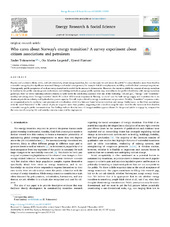Who cares about Norway's energy transition? A survey experiment about citizen associations and petroleum
Peer reviewed, Journal article
Published version

Åpne
Permanent lenke
https://hdl.handle.net/1956/21627Utgivelsesdato
2020-04Metadata
Vis full innførselSamlinger
- Department of Government [457]
Originalversjon
https://doi.org/10.1016/j.erss.2019.101357Sammendrag
Experts and academics think, write, and talk extensively about energy transition, but can the same be said about the public? A comprehensive move from fossil to renewable energy implies significant structural changes and social consequences, for example linked to employment, mobility, and individual consumption patterns. Consequently, public acceptance of such an energy transition is needed for its success in democracies. However, the extent to which the concept of energy transition is familiar to the public remains poorly understood, and existing methods to gauge public opinion may overestimate the public's familiarity with energy transition pathways. Here we invite randomly selected citizens to write down the words they associate with one of the following: “oil and gas”, “energy,” and “transition,” notably not asking about “energy transition” itself. We collect 3232 textual responses in Norway, a crucial case for both energy supply and transition due to its dominant petroleum industry and hydroelectric power capacity. Overall, topics related to energy transition are not prevalent. Notably, “transition” responses center on reorganization in the workplace and government centralization, while few links are found between transition and energy. Furthermore, we find that associations with the word “transition” in the context of jobs are negative more than positive, suggesting risks related to using the same word for the movement from fossil to renewable energy in public communication. Our findings indicate that the issue of energy transition appears distant for the general public to engage in, compared to the concerns of everyday life and notably concerns connected to employment.
